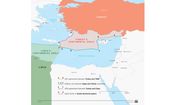Storm Brewing in the Former Grand Duchy of Lithuania, i.e. Seminal Developments in Belarus

Minsk, Belarus (photo: Pixabay)
On the one hand, there is nothing to pretend that such an option was always impossible (at least I am not going to pretend that I ever ruled it out), because of the Great Stone Industrial Park (with a 5% share belonging to Duisburg), the ubiquitous Chinese inscriptions in Minsk, and the 10 years (and even more) of smiles and the so-called “good climate” in Belarus-China relations.
On the other hand, this was only 10 years (or more) of backslapping. Only so much, or – if it turns out that this will lead to permanent changes after 2019 – “so much”.
In any case, now that Belarus has had a knife to the throat (or a gun to the head, if someone looking to go beyond Ivan the Terrible, prefers the 20th century version), then it turns out that the Middle Kingdom has found the money for a USD 500 million loan for any convenience of Minsk.
And what’s interesting is that, as Bartłomiej Radziejewski from Nowa Konfederacja and Ruslan Szoszyn write in Rzeczpospolita, “at the most appropriate moment for Belarus, and the least appropriate for Russia” (it happened on the last day of the unification negotiations – which was considered accidental and therefore irrelevant by the vast majority of the expert community in Poland).
This raises very important questions, a list of which is presented below. However, one thing is beyond doubt. This rather modest transfer, just at this particular moment, changes the situation in the immediate vicinity of Poland, and what could once only have been considered one of many options – and not necessarily the most probable – is now becoming a reality.
It is now clear that China likes the situation in which Belarus exists (independent or not entirely dependent on Russia, but still exists).
And when this fragile statehood begins to be threatened, they are able to make real moves in this matter and go beyond the formula of symbolic gestures or courtesy smiles, sending a ‘modest’ (from the Chinese perspective) transfer.
And here comes the whole list of questions that need to be answered, outside or on the margins of official discourse in Poland:
First, what will Russia do (or be able to do)?
Entering the traditional Russia’s backyard, ostentatiously interfering in the affairs of a (supposed) Russian minion state, is a slap in the face. Belarus for Russia is like Hong Kong (or Taiwan) for (Greater) China. Beijing has openly challenged this. And there is no imperial Russia without Belarus (and Ukraine). And what now?
Secondly, what cost can China bear to maintain a fragile Belarusian statehood?
Belarus is an important communication element of the New Silk Road (next to Russia). Is it worth investing in a country for that reason alone, and putting yourself at risk in Russia?
China strives to avoid sponsorship or open engagement, since it generates costs. Instead it prefers specific deals based on specific benefits (not always symmetrically distributed between countries, often not always evenly distributed in specific countries or societies).
How valuable is Belarus for China? Was this a one-time transfer or was it the beginning of a whole chain of such contributions and commitments to keep Minsk afloat? Everyone knows that China has got resources that would allow it to outbid the Russian Federation without major difficulty. But will they want to? And what they will want in return?
Third, what will it cost Belarus?
Is Alexander Lukashenko’s idea of Belarusian statehood like “putting himself under the protection” of an even stronger Chinese imperial power, who in the meantime rose in the Far East and now shadows Moscow? Will he expect only a symbolic tribute or specific tangible benefits? And whether the concessions will prove to be even more painful for a not-very-wealthy, young state, and Belarus will fall into even greater (and even more unacceptable to us in Poland) dependence, but this time from a distant Emperor residing not in Moscow, but behind the Great Wall in the Northern capital – Beijing?
Fourth, if Beijing decides to “establish a permanent transfer” for a weak and threatened Lukashenko-run Belarus, how much will she be independent of Russia in this concept and, above all, how independent (or dependent) will she be on China?
Will it be conditional (dependent) only on China or also to some extent on Russia? Will Belarus remain a stable, unacceptable dictatorship in this situation, or will it become an area of power rivalry, which always has the potential to cause chaos (as in Ukraine)?
Fifthly, what about Lukashenko?
Will the government be taken over by Kolya Lukashenko, who since 2017 regularly participates in the summits of the Belt and Road with his father (I had the opportunity to see them there personally two years ago)? How will he (or another successor of Lukashenko) find himself in this extremely complicated game and not just with anyone, but with Russia and China (plus with the EU and the United States in the background)?
Can you imagine more difficult conditions for a successful succession? Will the price be a reduction of Belarusian statehood to a symbolic dimension (or maybe the current one may be considered symbolic or not?) – Or after a few decades, its complete liquidation?
Sixth, and most important to us (in Poland), what will the United States and the European Union do?
Seventh, Russia again.
After all, one cannot rule out an option in which China is banging the drum only to recognise that Belarus, however, has neither significant assets (nor more resources) for China and ultimately make arrangements with Russia, obtaining additional concessions from Moscow (thus treating Belarus as a bargaining chip) …
Then Belarus will remain alone with Russia, and China would discount it in a different way (the question is what could Russia propose for China’s non-involvement in Belarus, which as we see is possible).
Eighth, what does this mean for Poland?
It seems that nothing has come of the democratisation of Belarus in which Poles have invested so much and on which have worked so persistently (at least until now).
Minks fights for survival and does not hesitate to pull the Chinese lever. It is a pity that it is not Lech Kaczyński’s ambitious Jagiellonian policy that contributes to the preservation of Belarusian statehood, but a distant and newly-grown power east of Russia (representing values unacceptable to democratic Poland).
I hope that one can look the truth in the eye and ask a politically incorrect question:
What if the former Grand Duchy of Lithuania enters the orbit of Beijing’s influence?
Last but not least, China can wait and we already know that. Like a stock market player, they show up when a good time comes to buy and the price of assets falls. Then you can buy quite cheaply and as the examples of many countries show, maybe even take over the controlling stake.
It seems that this time China has chosen the best possible moment to send the transfer. I think it was also the best moment for Belarus.
The alternative was the next step in the unification with Russia, which as it turns out, neither Alexander Lukashenko nor the Belarusians wanted, also those factions in the society that are watching Bielsat, who still like having their own country, albeit weak and increasingly dependent.
But will this strategic convergence last long? And will it exist at all? And if so, what will it lead to? What other options will appear here? Should we think about it in Poland, or should we not ask ourselves such questions at all?
Autor
Radek Pyffel
(born September 7, 1976) also known as Radek Pyffel or Rui De Xing (Chinese: 瑞德兴)
PKP Cargo Board Representative for Eurasia, Head of China Business Program at Kozminski University.
In 2016-2018, Radek Pyffel served as an Alternate Director and a member of the Board of Asian Infrastructure and Investment Bank, representing Poland and Wider Europe Constituency.
Radek has graduated the sociology department at the University of Warsaw. He has also studied at the Sun Yat Sen University in Guangzhou, Taiwan Normal University and Peking University.
Radek authored books, educational programs and numerous articles, published in Polish and international newspapers.
An avid sport fan, he made over 100 appearances as a striker for the Polish National Team of Journalists.
Radek speaks Polish, English, Chinese and Russian.






Trwa ładowanie...